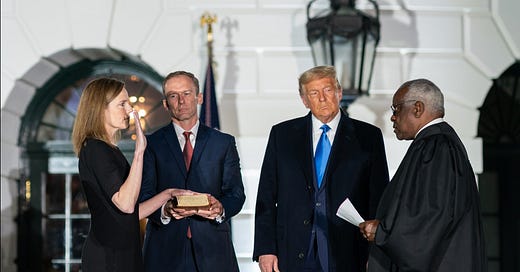The Supreme Court’s new ethics code is a confession
A toothless document that imposes no requirements on the Justices, but does accidentally acknowledge that things they've done are unethical
After years of Supreme Court scandals that have led to the lowest public confidence in the history of the institution and growing calls for reform, the Court today unveiled a new ethics code that proves three things: The Justices have been behaving unethically for years, they are feeling the heat, and they still cannot be trusted to police themselves.
Let’s take the last part first: The ethics code the Court released today is really not really an ethics code at all. It is a list of suggestions and aspirations, with nary a requirement or a consequence to be found. Nothing in the document in any way binds the justices to behave ethically, imposes any requirement on them, or provides for any remedy or consequence for falling short of the principles it outlines. How toothless is the document? It uses the word “should” 53 times and the words “shall” and “must” a combined total of only 6 times. It’s little more than a press release. As a general matter, no politicians – and the Supreme Court justices are politicians – should be entrusted with policing themselves. The Supreme Court just reminded us why.
So why bother releasing such a transparently empty document? Because the justices know their corruption has caught up with them. Clarence Thomas’s (undisclosed), all-expenses-paid junkets with right-wing billionaires … the (undisclosed) forgiven loan from a billionaire Thomas used to buy a quarter-million-dollar recreational vehicle … the (undisclosed) sale of his mother’s home to a right-wing billionaire … the years of (undisclosed) payments from conservative activists to Thomas’s wife … the (undisclosed) tuition payments Thomas’s billionaire benefactor made for a relative in Thomas’s care … Neal Gorsuch’s (undisclosed) sale of a 40-acre property to the head of a law firm that has been involved in at least 22 cases before the Court during Gorsuch’s tenure … Sam Alito’s (undisclosed) luxury fishing trips with a right-wing billionaire who has had business before the court … the millions of dollars in (undisclosed) payments from law firms with business before the Supreme Court to Chief Justice John Roberts’ wife … these scandals and more have led to the lowest public confidence in the Supreme Court in the history of polling. The stench of corruption is unmistakable – and Congress is threatening to act. The Court’s phony new ethics document is the act of justices desperate to improve their image and arrogant enough to think they can do so without submitting to any real ethical requirements.
Although the Court’s ethics document is utterly useless as a guardrail against the corrupt actions of its Justices, it does have some value: It serves as an inadvertent acknowledgement that the Justices have behaved unethically. It is a confession, of sorts.
For example, the document states “a Justice should not participate in extrajudicial activities that detract from the dignity of the Justice’s office, interfere with the performance of the Justice’s official duties, reflect adversely on the Justice’s impartiality…” But Clarence Thomas has secretly participated in Koch network fundraising events and appeared with Mitch McConnell at political events, and Amy Coney Barrett spoke at a Federalist Society gala just last week – to pick just a few high-profile examples of the justices undermining their impartiality by participating in events with activists.
The new document states “For some time, all Justices have agreed to comply with the statute governing financial disclosure, and the undersigned Members of the Court each individually reaffirm that commitment.” But there’s a difference between agreeing to comply with financial disclosure statutes and actually complying. The justices might have done the former, but they haven’t bothered with the latter.
For years the Supreme Court justices have been failing to disclose payments, gifts, real estate transactions, forgiven loans, and assorted other favors received, and have participated in political events held by activists organizations and their funders. Now the Court is telling us this is all quite unethical. We already knew that, and we already knew the Court cannot police itself.
Congress must act.








